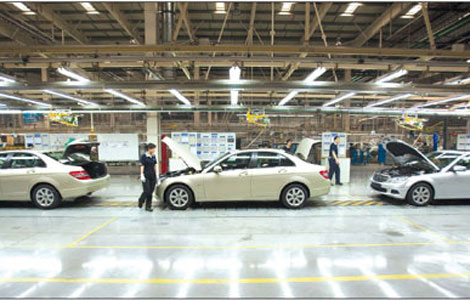Economy
New five-year mission
Updated: 2011-03-15 15:50
(China Daily)
In his signature candid manner, Premier Wen Jiabao addressed some of the toughest questions facing the country at the press conference that capped the annual session of the National People's Congress (NPC), the national legislature.
Although the development program the NPC has approved for the next five years has set a lower target for growth, the coming years are likely to be more challenging than ever.
The variety of balancing acts that will need to be carried out calls for sophisticated helmsmanship at all levels of government. That is where the real challenges lie.
Given the strong momentum of gross domestic product (GDP) growth, an annual 7.5-percent rise is no problem technically. But the voluntary slowdown in growth will be meaningless if the parallel goal - to facilitate the transformation in the mode of growth - ends up unfulfilled.
This goal has been enshrined as a core concept of the Scientific Outlook on Development for some time. Yet little has been achieved. Since the development goals set for the next five years rest heavily on realizing such a transformation, the government can no longer afford little substantial headway in this direction.
However, as Premier Wen acknowledged, there will be no end to the GDP fetish unless the performance of officials is evaluated by different criteria. Considering the clamor surrounding a "happiness index" at the just concluded NPC session, we would like to see corresponding deliberations in rethinking the yardsticks for the performance of government functionaries.
| ||||
Premier Wen said it is incorrect to make an analogy between China and the countries in West Asia and North Africa that are undergoing internal unrest. But the general consensus that the same is unlikely to happen in present-day China is based largely on the government's commitment to public welfare. To maintain stability and unity, the government must demonstrate with tangible benefits its capacity of making good its promise of "inclusive growth".
The biggest threats to the public's sense of well-being, and hence stability, are inequality and injustice. And both have to do with corruption, which Premier Wen singled out as the No 1 threat.
Political reform should be a gradual process. Few in this country are in favor of abrupt changes. Having been through the political dramas of the past decades, most people want stability. But a stable and harmonious social environment and political reforms are each the precondition for the other.
As non-economic factors have an increasing impact on people's sense of well-being, the government will find higher public expectations of its self-regulation. Which makes political reforms necessary to guarantee and promote economic restructuring.
E-paper

Factory fever
Despite auto manufacturing bubble scare, car giants gear up expansion of factories.
Preview of the coming issue
Dressed for success
Fabric of change
Specials

Earthquake Hits Japan
A massive 8.8 magnitude quake hit the northeast coast of Japan on March 11,2011.

NPC & CPPCC sessions
Lawmakers and political advisers gather in Beijing to discuss major issues.

Slide: Japan quake
Devastating earthquake and tsunami left millions without water, electricity, homes or heat.




